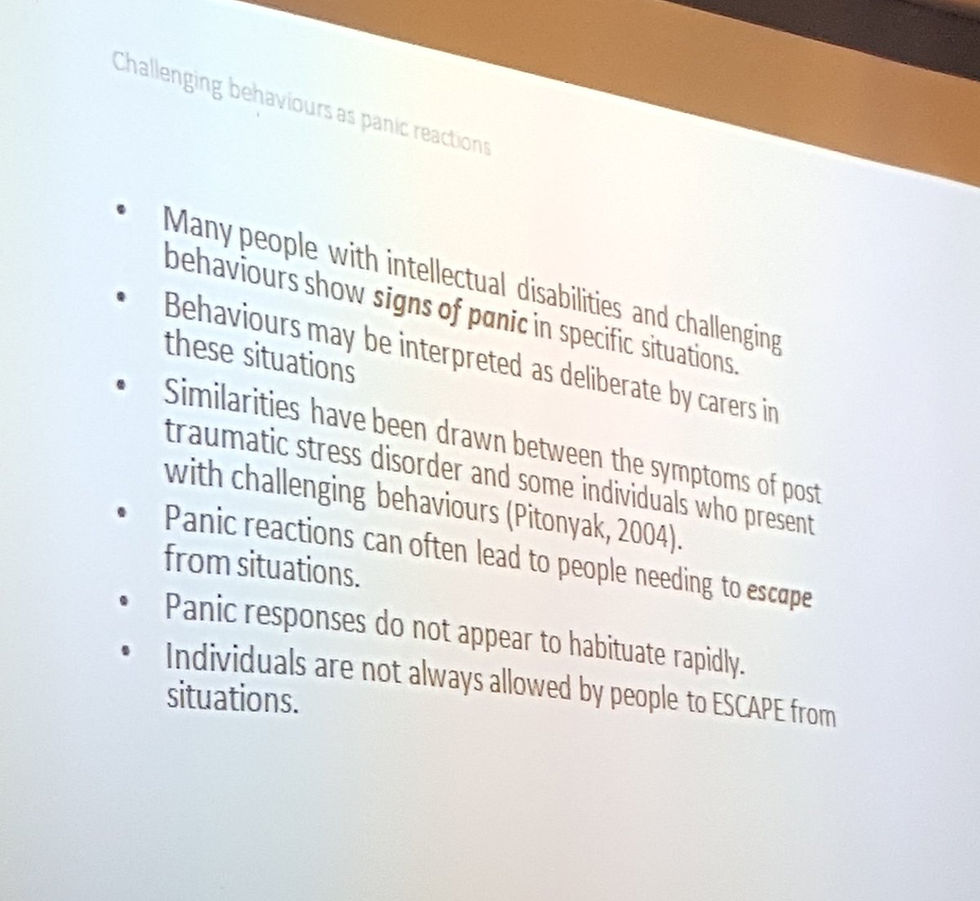Professor Andy McDonnell at #CoPro19
- May 13, 2019
- 3 min read
Updated: Mar 5, 2025
Keynote speaker Professor Andy McDonnell on understanding stress, arousal and emotional regulation in context.

#CoPro19 is an event organised by Gareth Morewood of Priestnall School, Stockport, and Elly Chapple, founder of CanDoELLA.
This event, which took place on 21st January 2019 at the Stockport Conference Centre, featured several speakers on the topic of co-production in education, discussing the ways in which educators can #flipthenarrative in schools for children with developmental differences by working together to effect change.
Keynote speaker Andy McDonnell kicked off proceedings with a presentation on understanding stress, arousal and emotional regulation in context, and how low arousal can be applied in classroom settings.
Firstly, Andy acknowledged that fear is sometimes part of our work as educators and carers, and that recognising how fear impacts our responses is key. Sometimes, people are scared of the person they are supporting – worried that they might behave in an aggressive manner, or react badly to suggestions. In these circumstances, Andy argued, low arousal approaches are essential. The first step to overcoming fear is to acknowledge that it exists, and secondly, examine how to support carers when they are fearful.
‘It’s a mindset in education, it’s not about resources.’ (Elly Chapple via Twitter @elly_chapple)
Andy went on to say that having a fearful response to someone we are supporting’s behaviour does not make us ‘bad’ people or ‘bad’ carers. In stressful situations, it is natural to panic and act irrationally. The key to helping someone, Andy says, is to manage your own stress first. To step back and be mindful. To stop being adversarial, and start being reflective.
In a recent collaboration with Northumbria University and PhD student Daniel Rippon, research has shown that stress has a significant impact on carers. The high levels of the stress hormone cortisol found in the hair of carers for dementia patients demonstrates a larger, sector-wide prevalence of carer stress. Even when a person does not feel stressed, this study shows that stress leaves physical markers which can affect overall well-being.
In short, we are working with highly stressed individuals when we ourselves are highly stressed, meaning that stress reduction and coping skills should be implemented, not only in the lives of the people we are supporting, but should also be practiced in our own daily lives.
‘Frightened and highly stressed people make poorer decisions’ - Andy McDonnell

Andy goes on to share Studio 3’s mantra; that you can not talk about stress without also talking about coping. He says, ‘Lazarus & Folkman (1991) linked stress and coping. Coping strategies are a critical variable in this model. In this model, individuals with high levels of stress but with high levels of coping responses do OK.’ This is why it is important not to resort to restraining challenging individuals, but teaching them healthy coping mechanisms in order to approach stressful situations differently.
However, Andy explained that trying to talk to people mid-crisis is not necessarily helpful. This is when de-escalation skills such as low arousal become incredibly useful; learning to diffuse crisis situations without the use of physical restraint.
‘When a person is drowning that is not the best time to teach them how to swim’ (David Pitonyak)

Furthermore, Andy also discussed the importance of having an emphatic, understanding and forgiving mindset when working with children, young people and adults who can be challenging. It is important to learn to forgive when individuals react aggressively, and also to recognise that they are not always responsible or in control of their behaviour. By learning to forgive, and not respond in kind with anger and distrust, there is a higher chance of changing outcomes.
In addition, Andy discussed clinical terms such as ‘client, case and service user’, which dehumanise individuals and portray them as ‘problems’ to be ‘fixed’. Andy concluded by emphasising that we need to listen to the children and young people we support, and be open to adapting to their needs and preferences.
‘We are not trying to fix people who are broken’ (Gareth Morewood via Twitter @gdmorewood)
Other speakers from the event included Barney Angliss, who discussed being a regular hospital inpatient with diagnosed Asperger's, and why we should avoid doing things to people and focus on helping them. Jo Billington of the University of Reading discussed autism and education, and how we can make a difference to primary-school aged children by examining the barriers and facilitators to inclusion. The full event programme can be viewed here: http://www.gdmorewood.com/wp-content/uploads/2019/01/Copro-Programme-Jan-19-1.pdf
For more information on Studio 3’s work in education, see the new one-day low arousal course in conjunction with Gareth Morewood here: http://www.gdmorewood.com/wp-content/uploads/2019/01/Autism-Emot-Reg-Flyer-2019-one-day-training.pdf.












Comments